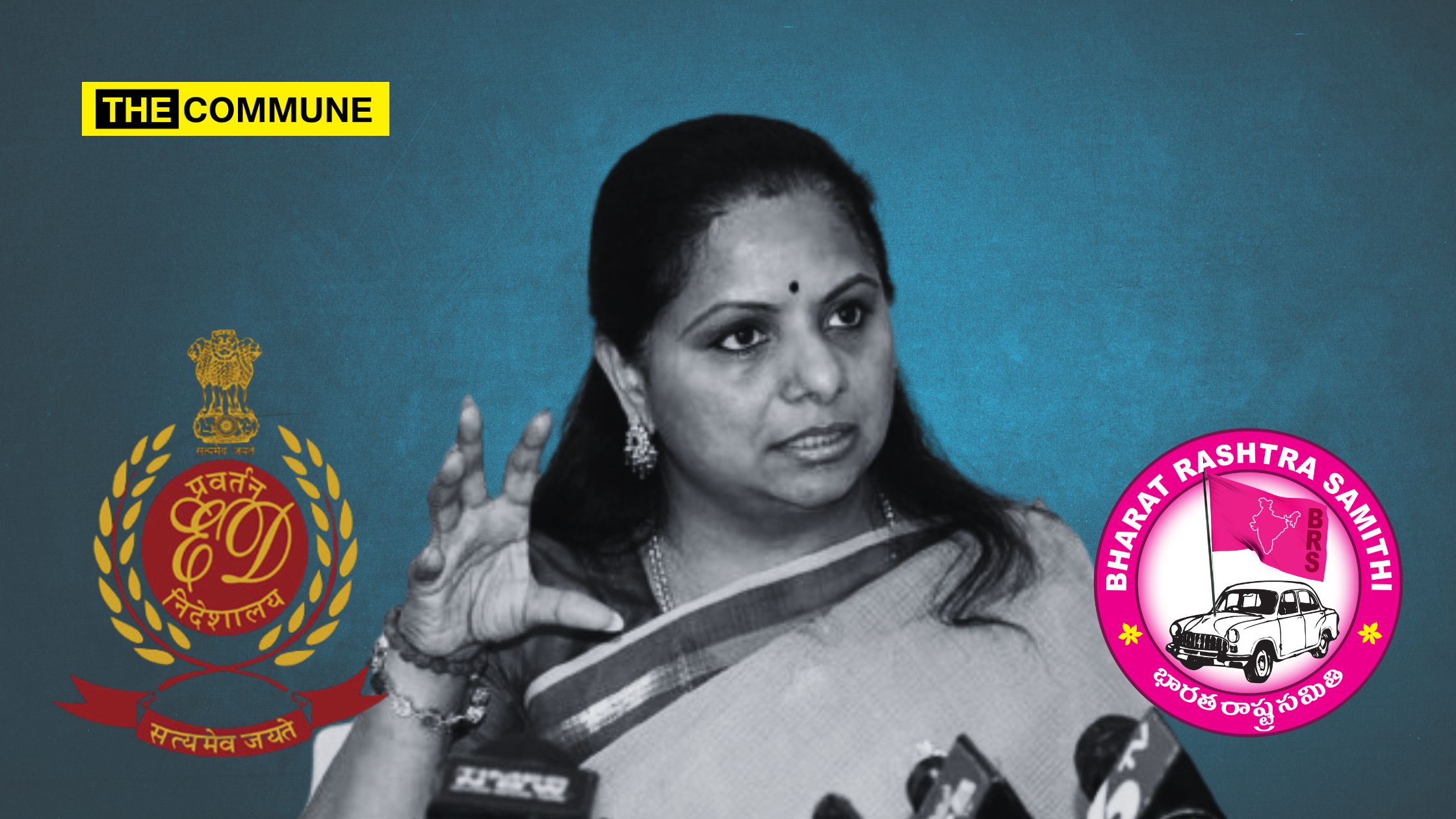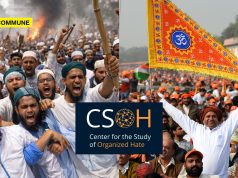
On Friday, 15 March 2024, BRS (Bharath Rashtra Samithi) leader, K Kavitha, the daughter of BRS chief and ex-Telangana Chief Minister, K Chandrasekhar Rao, was arrested by the ED in connection with the infamous Delhi Liquorgate Scam. Several months ago, while the BRS was still in power in Telangana and her father was chief minister, K Kavitha was named a prime accused in the Delhi Liquor scandal, as a key participant of the “South Group” whose role in the liquor scandal was found to be a significant one in receiving kickbacks for liquor licences & sale.
In a quick reversal of trends and political prospects, Telangana’s BRS is now slotted to fall to third place behind the Congress and the BJP for the upcoming Lok Sabha elections. Less than six months ago, before the recently held November 2023 Telangana state elections, the BRS’s political prospects and fortune were almost double what they appear to be at this point in time.
So what went wrong in a matter of a few months for a party that was in power for almost ten consecutive years through two state elections and one national election? It has only been ten years since the BRS shot into the national limelight as Telangana state’s first regional party in power after the division of the erstwhile state of Andhra Pradesh into Telangana and Andhra in 2014. Yet, within a short span of ten years, it has seen a lifetime of highs and lows.
The party was previously known as TRS – Telangana Rashtra Samiti, a regional party founded with the principal aim of seeking a separate state for the Telangana region within the larger state of Andhra Pradesh. Kavitha’s father and BRS chief K Chandrasekhar Rao managed to accomplish the primary goal of his BRS (formerly TRS) in 2014, in conjunction with the Congress government at the centre, in the creation of a separate state, carved out from the larger state of Andhra Pradesh.
His party’s main premise for seeking a separate statehood for Telangana was the claim that the Telangana region within the larger Andhra Pradesh was socially and economically ignored by political leaders, who for the most part, hailed from the Andhra region. Another theory claimed by Rao and his BRS/TRS was that while both Telugu-speaking regions of undivided Andhra Pradesh were linguistically similar and shared some common history, they were socially and culturally different.
His claims were disproved by a central commission created to study the alleged social and economic disparity between the Andhra and Telangana regions within the state of undivided Andhra Pradesh. Based on its findings, the Srikrishna Commission recommended the continuity of a united Andhra Pradesh and suggested that the state should be divided ONLY under unavoidable circumstances.
Despite the survey results of the Srikrishna Commission, the Sonia Gandhi-led Congress at the Centre in 2014 agreed to the TRS/BRS’s demand for the division of the state into two Telugu-speaking regions. At the time, there was widespread criticism and allegations of a purely political motive behind the Congress’s decision to split the state, despite the Srikrishna Commission’s findings. Almost ten years after the event, K Chandrasekar Rao and his family-centered party find themselves isolated from both the Congress and the BJP.
Political reasons aside, Andhra and Telangana analysts believe this is partly the doing of Chandrasekar Rao himself, who is often chided for his crude personal attacks on leaders of all opposition parties including the Congress, the BJP, and the Telugu Desam Party (TDP). Rao finds himself without friends across party lines at a time when his daughter is being investigated for her involvement in a major liquor-related scam.
Reasons For The BRS’s Present Predicament
Many tall leaders of the BRS were originally from the Telangana state unit of the TDP and a few from the Congress as well. Their loyalties are split between their ‘original’ parties and the BRS, which they joined in 2014 for temporary benefit. After the party’s recent loss in the 2023 state elections, a number of these leaders have left the party in search of greener pastures.
The BRS is still seen as a family party of K Chandrasekhar Rao, with the most coveted positions reserved for his immediate family (both his son and daughter were elected members/ministers) and extended family (his brother-in-law, Harish Rao, etc.). Rao is now an older man with health issues. Is the next generation of the Rao family ready for the uphill task of rebuilding and rebranding the party and helping it win another election or will it fade into oblivion after a short streak of success? In the current circumstances, will the party survive potential rivalry among family members?
The first term of the BRS/TRS administration rode on a wave of the separate statehood sentiment, giving the BRS a significant emotional and sentimental advantage over the Congress, the TDP, and the BJP parties. However, by the second consecutive term, the initial euphoria of the people was beginning to die down and their support for the BRS was further dampened by several instances of arrogant behaviour and corruption by BRS leaders.
Aside from the initial advantage of the BRS in terms of its role in the creation of a separate state, the BRS does not have a distinct political ideology, different from that of the Congress. Its supporters and voters are inclined to vote either for the BRS or the Congress, easily switching between the two parties based on which of the two ideologically similar parties offers better welfare schemes and free handouts.
Implications Of The K Kavitha Arrest
The BJP doesn’t see the BRS as a partner in the near future. Chandrasekhar Rao has not been on comfortable or favorable terms in the past, with either Modi or Shah. It appears that the BJP does not see near-future prospects of a mutually beneficial political partnership.
The BRS’s alliance with the minority-based AIMIM led by Hyderabad native, Asaduddin Owaisi, may also be a deterrent for the BJP, even if it chose to consider a potential partnership with the BRS.
The BJP’s goal of growing its own voter base, preferring to retain a strong and distinct identity in various states Versus a continued reliance on partnerships with regional parties who may not share the BJP’s political ideology.
The BRS’s weakened position serves the BJP’s organisational goal of reducing the importance and relevance of regional parties that do not share a similar political ideology centered on economic development, decentralisation, private business opportunities, the smaller role of government and bureaucracy, financial prudence, national security, nationalism and pride in a common, pan-Indian a civilisational and cultural heritage.
There is news of many BRS leaders – both MLAs and MPs quitting the party in favour of either the Congress or the BJP. The BRS exodus appears to be benefitting the BJP, in line with their expectations that a weakened BRS will add to the BJP’s own strength in Telangana.
Evidence against AAP’s Kejriwal gets closer with the arrest of top-tier, high-stakes political leaders like K Kavitha. Jagan Reddy’s YSRCP leaders, whose involvement in the Delhi Liquorgate scandal was investigated by the ED, have already turned approvers for the agency and have shared crucial information on a few AAP leaders. If Kavitha acknowledges the information already gathered by the ED and divulges any additional details, Delhi CM Kejriwal would be in trouble for his direct or indirect involvement in the liquor scam. As of Thursday, 20 March 2024, Kejriwal was taken into custody by the ED for interrogation.
The BJP doesn’t see a future with Andhra’s YSRCP either. Jagan Reddy’s Andhra-based YSRCP is equivalent to Chandrasekhar Rao’s Telangana-based BRS. Both leaders are reported to share a close rapport, especially in the areas of political alignment and personal business interests.
Both parties have a past with the Congress for their own reasons. Both parties toe the same line as the Congress with their political strategy of minority appeasement and/ or alliance with minority vote-bank groups. Ideologically, both the BRS and the YRSCP are closer to the Congress-Left-Secular grouping than they are to the BJP’s capitalist, cultural, and nationalist leanings. The BJP, by choosing to distance itself from Telangana’s BRS as well as Andhra’s YSRCP, sends a clear, ideologically-loud message to the Telugu electorate of both states.
Shivani is a freelance writer from Vijayawada.
Subscribe to our channels on Telegram, WhatsApp, and Instagram and get the best stories of the day delivered to you personally




